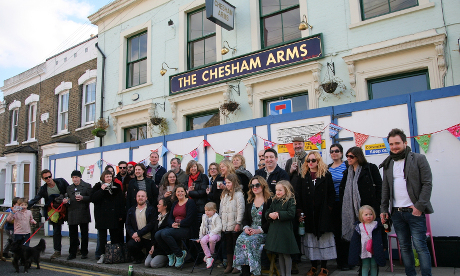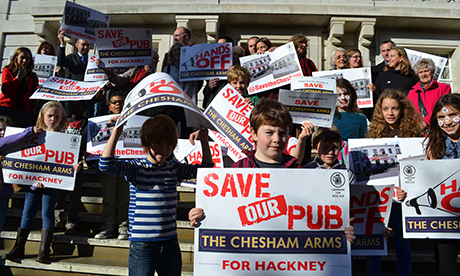Victory for Chesham Arms campaigners as developer’s appeal quashed
Campaign group Save the Chesham Arms have secured a huge victory after the Planning Inspector refused to allow the 150 year-old pub building to be split up permanently into flats.
Hackney Council served a planning enforcement notice against owner Mukund Patel, after he ignored warnings and rented the upstairs of the pub on Metahebal Road as a flat without planning permission.
Mr Patel appealed the decision, arguing that converting the pub was allowed under permitted development rights – a national grant of planning permission, which allow some changes of a building’s use to be carried out without Council approval.
However, following a two day public inquiry, the Planning Inspector quashed Mr Patel’s appeal and upheld the Town Hall’s enforcement notice.
The Planning Inspector amended the notice, meaning Mr Patel now has until March 2016 to comply with its terms and cease using the upper floors as a residential flat.
The Planning Inspector ruled that dividing the building up would signal the end for the Chesham Arms. He said that not only would the Clapton Square Conservation Area suffer without the pub but that its change of use would be in breach of planning policies.
Protected
The planning inspector also mentioned that the Chesham Arms’ status as a registered Asset of Community Value (ACV) was a factor in his decision to uphold the notice.
The Chesham Arms pub, on Metahebal Road, became Hackney’s first ACV in March 2013 – a move that recognized the importance of the pub as a social space vital for the community and which offered the pub limited legal protection.
Chairman of the Save the Chesham Campaign, Jonathan Sockett, expressed his joy and said he looked forward to the developer abandoning his “unrealistic plans”. He said: “We always knew it was wrong for the landlord’s flat to be self-contained without permission and we are delighted that the inspector has dismissed the appeal.”
James Watson, a pub campaigner for the Campaign for Real Ale and local resident said the Chesham Arms case demonstrates the “disconnect” between planning and localism.
“Although this pub is an Asset of Community Value and the Community and Council have clearly tried to save it, nationally-set permitted development rights have allowed this developer to ride roughshod over the wishes of the community”, he said.
Cllr Guy Nicholson, Cabinet Member for Regeneration said: “The decision by the Planning Inspectorate will add an extra safety-net against the illegal development of this 150-year-old historic building, a success not just for the Council but for the whole community.”
A spokesperson for Mukund Patel said: “The upper floor flat will be rented out on the open market until the new compliance date of the March 23 2016 and a similar situation will occur with the ground floor offices to the same date.
“It is likely that in early 2016 we will review the position in light of national and local planning policy and permitted development prevalent at that time.”



All this talk of ‘saving’ the Chesham is well and good, but let’s consider why it’s currently no longer a pub. Has it been turning a decent profit as a pub, then presumably that’s what it would have remained. The fact that it’s no longer a pub surely suggests that it was no longer viable as such. And why? Because too few locals went in there and sunk a few pints. Pubs aren’t some sort of curiosity in an Edwardian-themed tourist attraction: they’re businesses. And unless people use them, they go out of business. I whole-heartedly wish the campaigners success in their attempt to retain the Chesham as a pub. But they must remember, if it ever reopens, that they need to go in there, spend some cash, and down a few drinks on a regular basis.
Gareth,
I think the latter part of your comment is spot on mate! People DO need to drink in their community pubs.
Pubs close at a rate of 31 per week and they are incredibly tough businesses to run due to high levels of tax, regulation, cost of produce, staff, overheads and so on.
They are also very rewarding to the publicans that labour in them and they play a unique social and cultural role in our society. We are all very much looking forward to spending many a happy evening sitting in (and in the beautiful garden of) The Chesham Arms. We have been waiting patiently for two years for the opportunity. Bring it on.
Can I now correct, if I may, the first part of your point? You assume, as many commentators do, that it was not making profit before.
This is a reasonable assumption but sadly a trap that far too many people, including the mainstream media and politicians, fall into. The Chesham Arms had been a viable business for 147 years.
We know the previous publican well. He was making money. He supported a family, two cars, took several foreign holidays and enjoyed life. He was given his marching orders by the owner. They chucked him out.
The Chesham Arms was not sold because it had failed and closed. Quite the opposite is true. The Chesham Arms was sold, the new owner then failed it! It then closed.
This was a deliberate act to destory the pub. It is not a question of viability at all, but merely one of greed. Pubs, like most other things (e.g. Mosques, Churches, Temples, Green Parks, Leisure Centres, Libraries, Casinos, Shops, Civic Buildings, Hotels, Laundrettes, Theatres, Cinemas) are worth more as residential use than as a commercial building.
To put it in real life figures, The Chesham Arms has been valued at £300,000 as a pub. This evidence was submitted to the above public inquiry. Mr Patel, the present owner, paid £650,000 for it. He paid over twice the market valuation. He has closed it for 2 years and lost around £23,000. See the calculations done on http://www.savethechesham.org.
The price he paid is clearly too much, but if it was reasonable to turn the pub into flats, no doubt these might sell for £500,000 per flat so that makes the £650,000 look fair. Of course it is not fair when valued as a pub.
This is why the planning system is absolutely CRUCIAL in protecting the community social infrastructure of our neighbourhoods.
Without it, London would simply be one huge sprawling mass of flats and houses, as these would always mean the most short-term profit. There was no shortage of regular punters in The Chesham Arms.
As a back street boozer, with VOA of £10,500, it took £7k per week through the tills and paid £30,000 a year in rent to the owner. That’s a 10% yield on freehold value so punching above the norm for London commercial property.
Please understand, this was never about viability (or lack of) but about short-term profit at the expense of the community.
To learn more about the importance of saving pubs in the planning system, look at the work of CAMRA – the Campaign for Real Ale. Cheers!